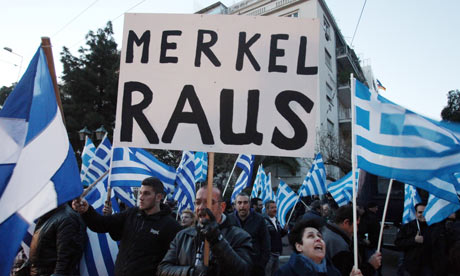Costas Douzinas theguardian.com, Tuesday 24 September 2013
Angela Merkel's re-election will heap yet more misery and austerity on southern Europe. But it may yet inspire a leftist victory in Greece
Supporters of the far-right party Golden Dawn hold up a sign that reads in German 'Merkel get out' during a protest outside the German embassy in Athens in March 2013. Photograph: Thanassis Stavrakis/AP
The German sociologist Ulrich Beck opens his latest book confessing how shocked he was when he heard in the news in February 2012 that "today the German Bundestag will decide the future of Greece". Southern Europe has become a declining underclass, while Berlin acts as a colonial master imposing brutal austerity. Calling his book German Europe, Beck joins a vigorous debate about the future begun by the German intellectual, Jurgen Habermas. For Habermas and the south Europeans, the question that should have dominated the German elections but did not was "Will Europe be German or Germany European?"
The European vote was clear: 82% of Spaniards, 65% of Portuguese and 58% of Italians rejected Merkel's policies in a recent opinion poll. But the German vote, the only one that counted, went the other way, giving Merkel unparalleled power on the German and European stage. The Social Democratic party (SPD) suffered the second worst defeat in its history, reminding us of the last British elections. Both results make sense. Why should anyone vote for either the SPD or Labour if their neoliberal policies are a pale version of what Merkel or the Tories offer?
As Habermas saw it, Merkel showed no leadership during the crisis, her main response being "soporific bumbling". He was proved right when, after her triumph, Merkel repeated mantra-like, that "we cannot prematurely drop the pressure on the south to reform". The pressure was indelicately applied on German election day with the troika representing the IMF, EU and ECB lenders arriving in Athens for the latest inspection round. Government actions will be examined to ensure that the Greeks have made satisfactory progress in sacking civil servants, cutting social services and privatising state assets. The Greeks will be ordered to foreclose the homes of families unable to pay the mortgage, a policy that had been banned for five years in a rare show of sympathy for the poor by the Greek government. These "reforms" have been imposed on Greece as precondition for the disbursement of the loan and are vigorously policed before each instalment is paid.
As a result of austerity, the Greek economy has shrunk by 25%, unemployment stands at a record 27%, youth unemployment at 70%. Debt to GDP ratio was 120% at the beginning of the crisis. It has jumped to around 175% after five years of suffering. Despite the IMF's recognition of a serious under-calculation of the effects of austerity on the GDP the troika doing Merkel's bidding will ask for more blood.
The second loan to Greece comes to an end next year. Current calculations indicate that the perpetual recession will create a fiscal gap of around €5bn in by 2016. A new loan and further austerity measures are currently being discussed. Greece is leading the race to the bottom, with salaries, pensions and working conditions coming close to those of China. Greece is the guinea pig: if the plan does not meet popular resistance and succeeds in decimating living standards, it will be exported to the rest of Europe.
On the way to the German poll another momentous event happened. Last week, the antifascist rapper Pavlos Fyssas was murdered in Athens, allegedly by supporters of the Golden Dawn neo-Nazi political party-cum-criminal gang. Despite daily fascist attacks on migrants, leftists, Roma and gays, no Golden Dawn member has been successfully prosecuted and a bill to put antifascist legislation in the statute-book was recently rejected by the government. Public opinion was shocked by the murder and the government was forced to act. The toleration of fascists was abandoned, with the government fearing that revulsion against the murder would rebound against it.
Habermas noted recently that the social decline in southern Europe "reminds of conditions in the late Weimar Republic that brought the fascists to power". It was a belated admission. Southern Europe has been in a state of emergency that has led to the rise of fascism. The German electorate rebuffed the hope that the north would mitigate the squeeze on the south out of self-interest or solidarity. Merkel, in a display of historical amnesia, does not seem to care and the Social Democrats have almost identical policies. A "grand coalition" between the two offers no hope to the south. The European Union's founding principles of prosperity, democracy and human rights have been set aside in the race for fiscal discipline.
Habermas and Beck believe that Merkel is destroying their ideal of "globalisation with a human face", a project that would start in Europe. For them, greater European integration is the only defence against unfettered capitalism. The plan was unconvincing from the start and has now been comprehensively defeated. The markets have imposed their will on politicians and German voters have accepted the Faustian pact. In the south, Europe now looks an elite project uninterested in ordinary people.
The salvation of southern Europe lies closer to home. In Greece a change in government is the only hope. The left's plan to cancel the catastrophic austerity measures, negotiate a substantial haircut of the debt that even the IMF deems unsustainable, and operate a moratorium on debt repayment until the economy starts growing offers the only realistic alternative. A victory for the left looks more likely if the German elections lead to a further turning of the austerity screw. It is a historical irony that the triumph of the most aggressive neo-liberalism at the centre may increase the prospect of a leftist victory in the periphery.
![The [Greek] European Tragedy](https://blogger.googleusercontent.com/img/b/R29vZ2xl/AVvXsEiWKI5s90SFm1wWTk6bs4p7CgslaC2SnYPsrZhb-B-smOufNNCSxCvpBLI9hOB-LsXZjir_PNmEiMk2-E62F3xkg96IoC6QFAaZAnPRTVH340IN9WBRmWJqPkjWlgyRj3zpALp7h6hvA58/s920/GkBack_new.jpg)

